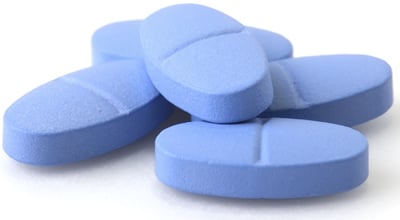Sex, Nitric Oxide, and Your Heart
Penile erection depends on the release of nitric oxide. Viagra and many other medications that reduce erectile dysfunction work on the next step of the nitric oxide pathway.

Sex, Nitric Oxide, and the Endothelium
Nitric oxide is made by the blood vessels’ lining, or endothelium. The endothelium is exquisitely sensitive to the physical and chemical conditions inside our blood vessels. When the endothelium senses heart-healthy conditions, such as physical activity and low cholesterol, it releases more nitric oxide. And that’s a very good thing. Nitric oxide expands the blood vessels, increasing blood flow and decreasing plaque growth and blood clotting.
Sex, Nitric Oxide, and an Unhealthy Lifestyle
Conversely, when the endothelium senses high cholesterol, high blood pressure, smoking, or emotional distress, it releases less nitric oxide, and atherosclerosis (heart disease) accelerates.

Attention, Gentlemen!
Penile erection depends on the release of nitric oxide. Viagra and other drugs like it that reduce erectile dysfunction work on the next step of the nitric oxide pathway. Are impotence and atherosclerosis closely related? Absolutely. Any lifestyle no-no that decreases nitric oxide, such as smoking, high blood pressure, and high cholesterol levels, causes both problems.
Nitroglycerin, which my grandfather took to relieve his chest pain, works by being converted into nitric oxide. In a sense, nitric oxide is the body’s own nitroglycerin. If you had first discovered how nitroglycerin and nitric oxide work, as three Americans (Robert Furchgott, Lewis Ignarro, and Ferid Murad) did, in 1998 you would have won the Nobel Prize for Medicine. Nitric oxide is that important.

Learn More About Pritikin
Inflammation: The Long, Slow Burn, and How It Harms Your Body
High blood pressure, high cholesterol, smoking, and obesity cause chronic arterial injury not only because they decrease nitric oxide release but also because they increase inflammation.
In many situations, inflammation is helpful, if not life-saving: when we are injured, for instance, or when we have a virus or other infection. The body naturally responds by rushing white blood cells to the area to begin damage control. Scar tissue is accelerated, which heals cuts and scrapes. Without inflammation, we could neither survive the simplest sinus infection nor close the smallest paper cut. In our evolutionary history, a vigorous inflammation response gave us a survival advantage, because infections and injury were more of a threat.
Today, with antibiotics readily abundant and fewer wild tigers on the loose, unchecked inflammation is left to cause many degenerative diseases including atherosclerosis, Alzheimer’s, and arthritis.
The only difference between inflammation of the regular sort and the kind that triggers atherosclerosis is that high cholesterol, high blood pressure, smoking, and obesity are initiating the inflammation, not infection or trauma. Unlike a brief infection or trauma, these risk factors are longstanding and therefore lead to chronic inflammation and plaque. Active plaques begin to resemble small abscesses on the inside of arteries. These active plaques are thought to be sites of future heart attacks.
Your Arteries Know How You Live!
Consider just a few factors about the link between the lifestyle changes we recommend and your heart health:
- Exercise not only gives your heart a workout and burns off yesterday’s pasta; it also pumps your nitric oxide and reduces inflammation.
- Watching a scary movie reduces nitric oxide in your arteries, but funny movies increase it. Like Santa Claus, your arteries know whether you’ve been naughty or nice.
More Facts About Sex and Your Health
The Power of Touch
Being touched by others is an essential human need. Babies who are not held do not develop and grow as they should. In a sense, we do not change as we become adults. Touch relaxes and bonds people in a way that no conversation can. From hand holding to cuddling and caressing, touch creates an intense sense of well-being in most people.
The ultimate touch—sexual activity—is more than a means of reproduction. Sexual activity releases stress and can mend even the bitterest argument with a partner or spouse. Touch and sexual relations stimulate the brain to release the hormone oxytocin, which is one of the hormones that bind people together (it is also associated with nursing). Oxytocin speeds wound healing and may decrease the risk of some cancers. Endorphins are also released during sex, as with exercise.
Sexual Activity and Calorie Burning
Sexual activity burns 100 to 200 calories, or the equivalent of walking one to two miles. Now, I know what you are thinking: “Do I have to walk if I have an active sex life?” The answer is yes. We want you to enjoy both long walks and committed and responsible sexual activities!
Sex and Your Heart
Does sexual activity reduce heart disease? Studies say yes. In one 10-year study, men who had sex two or more times per week experienced half as many heart attacks as did those who had sex less than once per month. In another study, college students who engaged in sexual activity once or twice per week had higher immunity to infection than those who abstained.

Get All the Details of a Stay at the Pritikin Center in Your Inbox
Excerpted from the book The Pritikin Edge: 10 Essential Ingredients for a Long and Delicious Life by Robert A. Vogel, M.D., and The Pritikin Organization, LLC (Simon & Schuster). Reprinted by permission of Simon & Schuster, Inc.